This article needs additional citations for verification .(January 2021) |

"Victory or death" and its equivalents, is used as a motto or battle cry.
This article needs additional citations for verification .(January 2021) |

"Victory or death" and its equivalents, is used as a motto or battle cry.
It is the name of a gun battery on the main gun deck of the U.S.S. Constitution.
It is given as the translation of the heraldic motto of several Irish clans and Scottish clans :
Mortem aut triumphum ("Death or victory")
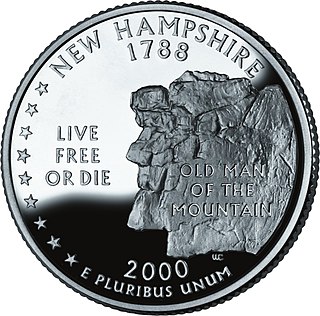
"Live Free or Die" is the official motto of the U.S. state of New Hampshire, adopted by the state in 1945. It is possibly the best-known of all state mottos, partly because it conveys an assertive independence historically found in American political philosophy and partly because of its contrast to the milder sentiments found in other state mottos.

Dieu et mon droit, which means 'God and my right', is the motto of the monarch of the United Kingdom. It appears on a scroll beneath the shield of the version of the coat of arms of the United Kingdom. The motto is said to have first been used by Richard I (1157–1199) as a battle cry and presumed to be a reference to his French ancestry and the concept of the divine right of the monarch to govern. It was adopted as the royal motto of England by King Henry V (1386–1422) with the phrase "and my right" referring to his claim by descent to the French crown.

Totenkopf is the German word for skull. The word is often used to denote a figurative, graphic or sculptural symbol, common in Western culture, consisting of the representation of a human skull- usually frontal, more rarely in profile with or without the mandible. In some cases, other human skeletal parts may be added, often including two crossed long bones (femurs) depicted below or behind the skull. The human skull is an internationally used symbol for death, the defiance of death, danger, or the dead, as well as piracy or toxicity.

Eleftheria i thanatos is the motto of Greece. It originated in the Greek songs of resistance that were powerful motivating factors for independence. It was adopted in 1814 by the Filiki Eteria, a secret organization formed specifically for the overthrow of Ottoman rule.

Clan MacNeil, also known in Scotland as Clan Niall, is a highland Scottish clan of Irish origin. According to their early genealogies and some sources they're descended from Eógan mac Néill and Niall of the Nine Hostages. The clan is particularly associated with the Outer Hebridean island of Barra. The early history of Clan MacNeil is obscure, however despite this the clan claims to descend from the legendary Irish King Niall of the Nine Hostages, who is counted as the 1st Clan Chief, the current Clan Chief being the 47th. The clan itself takes its name from a Niall who lived in the 13th or early 14th century, and who belonged to the same dynastic family of Cowal and Knapdale as the ancestors of the Lamonts, MacEwens of Otter, Maclachlans, and the MacSweens. While the clan is centred in Barra in the Outer Hebrides, there is a branch of the clan in Argyll (McNeill/MacNeill) that some historians have speculated was more senior in line, or possibly even unrelated. However, according to Scots law the current chief of Clan MacNeil is the chief of all MacNeil(l)s.

A battle cry or war cry is a yell or chant taken up in battle, usually by members of the same combatant group. Battle cries are not necessarily articulate, although they often aim to invoke patriotic or religious sentiment. Their purpose is a combination of arousing aggression and esprit de corps on one's own side and causing intimidation on the hostile side. Battle cries are a universal form of display behaviour aiming at competitive advantage, ideally by overstating one's own aggressive potential to a point where the enemy prefers to avoid confrontation altogether and opts to flee. In order to overstate one's potential for aggression, battle cries need to be as loud as possible, and have historically often been amplified by acoustic devices such as horns, drums, conches, carnyxes, bagpipes, bugles, etc..

Clan Maclaine of Lochbuie is a Scottish Clan that inhabited lands on the southern end of the Isle of Mull in the Inner Hebrides of the western Scottish Highlands. "Maclaine" is an alternate spelling for "MacLean." Clan Maclaine of Lochbuie and Clan Maclean of Duart are two separate clans. However, the two clans share a strong family connection. The 26th clan chief is The Much Honoured Lorne Gillean Ian Maclaine of Lochbuie, Baron of Moy. The clan is recognized by both the Standing Council of Scottish Chiefs and the Lord Lyon.

Dulce et decorum est pro patria mori is a line from the Odes (III.2.13) by the Roman lyric poet Horace. The line translates: "It is sweet and proper to die for one's country." The Latin word patria (homeland), literally meaning the country of one's fathers or ancestors, is the source of the French word for a country, patrie, and of the English word "patriot".

"In hoc signo vinces" is a Latin phrase conventionally translated into English as "In this sign thou shalt conquer", often also being translated as "By this sign, conquer".

Deus vult is a Christian motto relating to Divine providence. It was first chanted by Catholics during the First Crusade in 1096 as a rallying cry, most likely under the form Deus le veult or Deus lo vult, as reported by the Gesta Francorum and the Historia Belli Sacri.
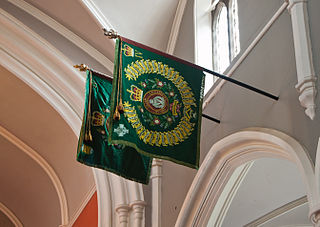
Faugh a ballagh is a battle cry of Irish origin, meaning "clear the way". The spelling is an 18th-century anglicization of the Irish language phrase Fág an bealach, also written Fág a' bealach. Its first recorded use as a regimental motto was by the 87th Regiment of Foot in 1798. It remains the motto of the Royal Irish Regiment today.

Audentes Fortuna Iuvat and the variations thereof is a common Latin proverb, typically translated as "Fortune favours the bold", "Fortune favours the brave" etc.. It is widely used as a slogan throughout Western civilization and history to emphasize concepts of courage and bravery, such as within various military organizations, and it is used up to the present on the coats of arms of individual families and clans.

Clan MacDowall or MacDouall is a Lowlands Scottish clan.
Mori is a surname and a given name.
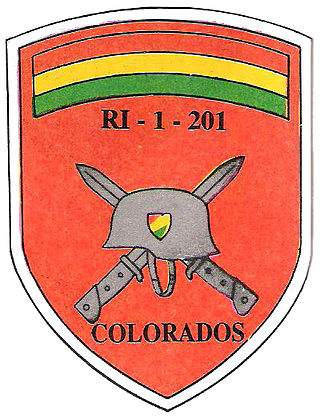
The 1st Regiment of Foot Infantry "Bolivian Colorados" National Presidential Escort Regiment of the Bolivian Army, formerly the 39th Line Infantry Battalion "Colorados" is one of the Army's oldest and most prestigious infantry regiments. It is headquartered in La Paz's Miraflores District, and is under the direct supervision of Bolivian Army headquarters.

Veni, vidi, vici is a Latin phrase used to refer to a swift, conclusive victory. The phrase is popularly attributed to Julius Caesar who, according to Appian, used the phrase in a letter to the Roman Senate around 47 BC after he had achieved a quick victory in his short war against Pharnaces II of Pontus at the Battle of Zela.

Wilhelm Sebastian von Belling was a Prussian Hussar general under Frederick the Great.
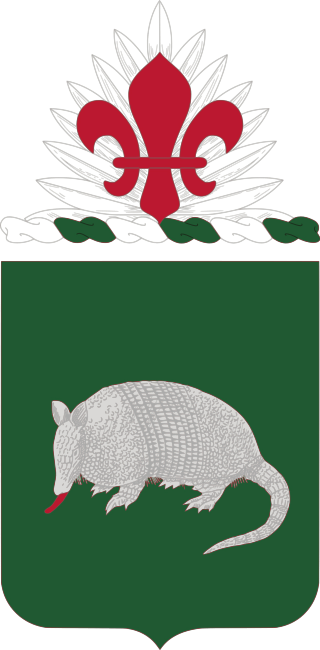
The 35th Armored Regiment is a regiment of the United States Army first established in 1941. The lineage of the regiment is carried on by the 1st Battalion 35th Armored Regiment, currently attached to the 2nd Brigade Combat Team, 1st Armored Division.
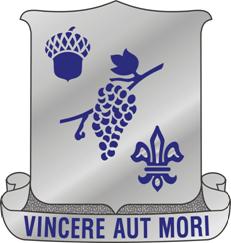
The 289th Infantry Regiment is an infantry regiment in the U.S. Army Reserve.